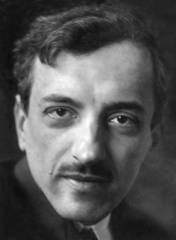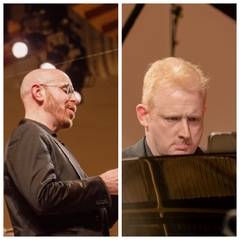|
Back
Unearthing a Ukrainian Genius New York
Kaufman Music Center, Merkin Hall
03/17/2023 -
Borys Liatoshynsky: Violin Sonata, Opus 19 – Two Romances, Opus 8 – Two Pieces for Viola and Piano, Opus 65 – Concert Etude-Rondo, Opus 55
Alban Berg: Four Pieces for Clarinet and Piano, Opus 5
Valentyn Silvestrov: Mystère
Volodymyr Zahorstev: Volumes
Steven Hrycelak (Bass-Baritone), Ginevra Petrucci (Flute), Gleb Kanasevich (Clarinet), Vladyslav Dovhan (Tenor Saxophone), Laura Weiner (Horn), Melissa Munez (Trumpet), Nuiko Wadden (Harp), Solomiya Ivakhiv, Johnna Wu, Marina Kifferstein, Andrii Didorenko (Violins), Colin Brookes, Jeremy Kienbaum (Violas), Valeriya Sholokhova (Cello), Daniel Anastasio, Yuliya Basis, Steven Beck (Piano), Talujon Percussion Ensemble
James Baker (Conductor)

B. Liatoshynsky
“Liatoshynsky’s Third Symphony is considered the greatest Ukrainian symphony of the last century–a work that manages to blend a modernist manner with great emotional depth and profundity. But, as was the case with the Second, the Party once again demanded Lyatoshynsky revise the work, including composing an entirely new fourth movement.”
Anon discussing the composer’s difficult career
“The Violin Sonata was written in the criminal period of my mistakes and offenses. Now, after 34 years, I still like this sonata and I regret that I have strayed far from those harmonies.”
Borys Liatoshynsky, quoted by Program Annotator Leah Balstone
One question and one complaint. First where has Borys Liatoshynsky been all my life? Second, why the hell did nobody tell me that the Lyatoshynsky Society or the Ukrainian Contemporary Music Festival were presenting no less than three concerts of his work this weekend??
Like Mieczyslaw Weinberg, the Polish-Russian composer who arrived suddenly out of nowhere and now is popular, Borys Lyatoshynsky’s music was severely censored during the Stalinist Period, yet he kept writing in his native Ukraine, changing styles, but retaining, like Shostakovich, an almost incalculable genius of inspiration and massive form.
Lyatoshynsky had quite the cultural life, living from Tsarist Russia in 1895, to the post-Stalinist USSR in 1968. Sometimes free to write, hounded to self‑censor, changing “schools” but always keeping the fire of incendiary inspiration.
To prepare for this initial concert, I listened to his Fourth String Quartet and the Fourth Symphony. But last night was confined to Lyatoshynsky’s earliest works, written in 1921 and 1926, when Leninist Russia was encouraging both Dodecaphonic and Dada. (Lenin, unlike both Trotsky and Stalin, was an intelligent and cultivated admirer of all “classical” music.) This was restricted to unknown (to this hack writer) vocal and chamber music, some with most curious ensembles.
Opening was a Violin Sonata, played with enormous emotional élan by Solomiya Ivakhiv and Simon Beck. It deserved nothing less, starting with a passionate opening movement, the themes of which were recapitulated in the finale. Yet it was the second movement that struck this listener. The harmonies were dissonant, almost discordant. Yet the harmonic harshness was transcended by a moodiness, a Cimmerian darkness.
Such a magnificent work was paralleled by Two Pieces for Viola and Piano, written 40 years later in 1965, less adventurous, perhaps, since he was part of the Soviet Establishment, conductor of the Ukraine Philharmonic, but equally accomplished.
The only solo work was a bravura Concert Rondo, played by Daniel Anastasia. I say “played”, but it was a dazzling display piece written for a music competition.

S. Hrycelak/S. Beck
(© Joanna (Asia) Mieleszko/Ukrainian Contemporary Music Festival)
All the music was stunning. But Two Romances was sung by bass-baritone Steven Hrycelak, and an eccentric ensemble. To wit, clarinet, horn, two violins, viola, cello and harp, held together by James Baker.
The program notes compare these two poems by Konstantin Balcom to Schoenberg’s Pierrot lunaire, and true the orchestration was similar. Yet Schoenberg paid little attention to the meaning of the hair‑raising words. Borys Lyatoshynsky took the two pessimistic nature-poems (“Reeds” and “Seared”), and gave the words their due. Sung in German like Expressionistic lieder, Mr. Hrycelak and his ensemble gave emotional relationships to “frogs splashing” or “darkness penetrating” or “shimmering reeds shuddering”.
Harmonies were close to Schoenberg’s atonality (never serialism), but Lyatoshynsky transformed the words to glowering sometimes agitated emotion.
For reasons beyond my ken, Lyatoshynsky shared the stage last night with some of his near contemporaries. This hardly seemed necessary, since Lyatoshynsky was a most prolific composer, turning out (not churning out) chamber music, operas, symphonies and songs. Still, for whatever reason, Berg, Silvestrov and Lyatoshynsky student Volodymyr Zahorstev were represented well.
Alban Berg’s rare Four Clarinet Pieces were played with the style they deserved by Gleb Kanasevich. Short, atonal, changing meter with every measure with a whiz‑bang scherzo.
Zahorstev was represented by an unusual quartet (clarinet, trumpet, tenor saxophone, violin and piano, conducted by James Baker). Again, Volumes was short, but packed with solid serial music. Complex to hear, difficult to coordinate together, but it worked.
Most unusual was the Mystère for flute and a massive assortment of percussion by Valentyn Silvestrov, another student. Here Ginevra Petrucci was accompanied by six players from the Talujon percussion group playing a salmagundi of timpani, bass drum, marimba etc etc. This was not the usual Silvestrov, with its love of jazz, popular music, explosive pppps to ffffs. This was gentle flute playing to a gentle tintinnabulation of bells and vibraphone. Yes, that expanded to a short cadenza for drums alone (never more than a mere fortissimo) before the return to the flute.
For those of us who love Silvestrov, it was a revelatory new picture of the composer. It seemed to be part serial, part percussive, and very much an example of a composer who declared, “I compose directly from intuition.”
The night belonged, though, to Borys Lyatoshynsky. Rather, the early Schoenberg-inspired Lyatoshynsky. Tonight (Saturday, March 18), will be Lyatoshynsky’s “Evolutions”, more chamber music. Sunday afternoon, I’ll be there to hear two of his quartets (along with Bartók, and Copland’s Sextet).
Yet am still waiting patiently–no, impatiently–to hear a live performance of his symphonies. Borys Lyatoshynsky, like Weinberg, needs that official recognition from the non‑Ukrainian West.
Harry Rolnick
|